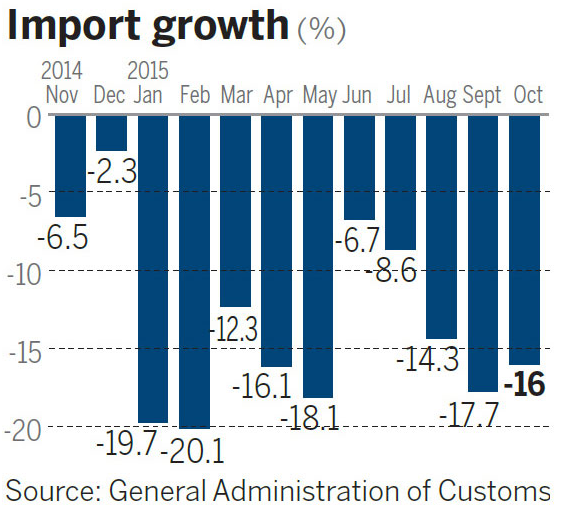Imports fall prompts call to draw back overseas consumption
Decline of 15.2% seen in the first 10 months, with overseas consumption partly to blame.

A sharp downturn in imports in the first 10 months of the year highlights the need to streamline regulation, trade specialists said on Sunday.
Imports from January to October fell by 15.2 percent year-on-year to 8.47 trillion yuan ($1.33 trillion), while Chinese tourists' overseas consumption grew at an annual rate of 25 percent from 2005 to last year.
According to the General Administration of Customs, China's total foreign trade-imports and exports-fell by 9 percent year-on-year to 2.06 trillion yuan in October, compared with a contraction of 8.8 percent the previous month.
It was the eighth consecutive month that trade had declined in the country.
The trade surplus widened by 75.3 percent to 2.99 trillion yuan, because of particularly weak imports.
Experts called for more effective measures to boost the domestic market and China's imports.
Zhang Jianping, director of the International Economic Cooperation Institute at the National Development and Reform Commission, said growing incomes, a stable yuan exchange rate, good services and simplified travel restrictions have attracted more Chinese consumers to stores and websites.
As many as 100 million Chinese travel abroad annually, spending more than 1 trillion yuan on their trips and accounting for 10 percent of global overseas consumption, according to the Ministry of Commerce.
Zhang said: "If half of this overseas consumption can flow back to the home market, it would generate a significant rise in China's imports. But to do so, merely cutting some tariffs and setting up duty-free shops is far from sufficient."
Cai Jin, vice-president of the China Federation of Logistics and Purchasing in Beijing, said manufacturing, e-commerce and logistics companies in China have been focusing overwhelmingly on expanding their export channels to the point where they have forgotten that import channels are equally important.
Cai said there is high demand for foreign merchandise in China, but competition is weak. "It would be good to allow more overseas logistics facilities and sorting centers to operate import business to China."
The top leadership has said that opening up service industries is a focus of its proposals for the country's 13th Five-Year Plan (2016-20).
Bai Ming, deputy director of the Market Research Department at the Chinese Academy of International Trade and Economic Cooperation in Beijing, said that in the long run China's free trade agreements with the Republic of Korea and Australia and demand for industrial upgrading may help to increase imports.








